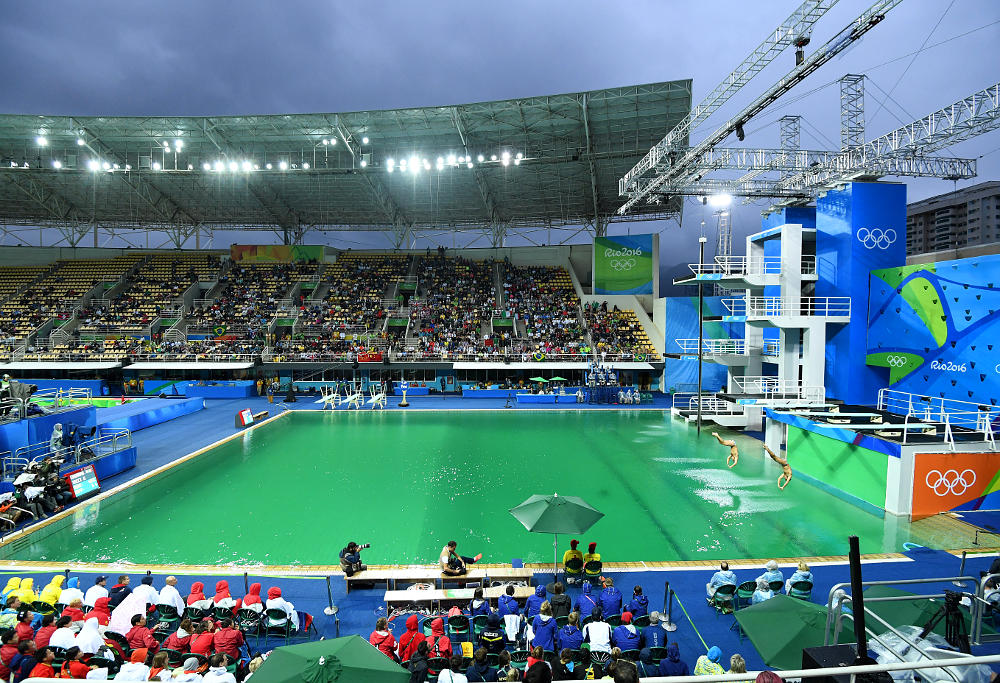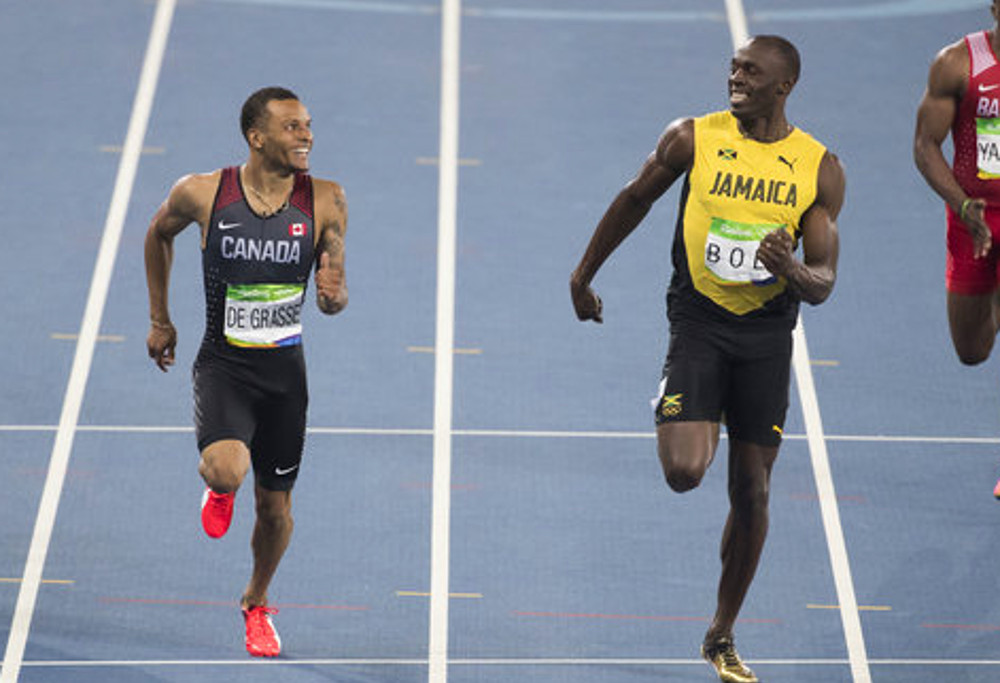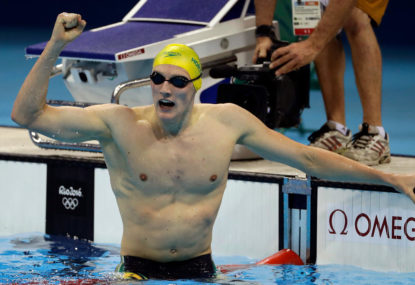The Olympics are always full of great and controversial moments. It’s a constant battle to be ready for the opening ceremony, then the Games begin and international tensions heat up.
Brazil was always going to be under fire after widespread poverty and health issues were highlighted during their hosting of the 2014 FIFA World Cup.
But they were not to be deterred and the games went ahead despite early concerns that the deadly Zika virus could stop the whole show.
Usain Bolt, Americans held at gunpoint, absent Russians and a young Aussie taking on the world in more ways than one.
Let’s have a look back at all the big talking points from the 2016 Rio Olympics.
The Zika virus and a lot of green water
Health and safety very quickly became a huge issue leading into the games and throughout the two weeks in August.
Rio was under immense pressure as the Brazilian government struggled to remain afloat and riots throughout the country caused massive damage to infrastructure.
Crime rate, poverty outside of the wealthy districts in Rio were rampant, as was health concerns related to pollution, water quality and of course, the Zika virus.
The virus is carried by mosquitoes and thrives in the moist and muggy conditions of eastern South America. Many athletes pulled out of the games in fear of contracting the deadly virus.
There were no cases reported in any athlete from the games in the end, but the World Health Organisation were petitioning for the games to be cancelled and relocated.
Guanabara Bay also came under heavy criticism for the immense amounts of pollution in the waters there, where the sailing and windsurfing would take place.
Fort Copacabana had similarly murky waters and Rio were unable to bring the pollution levels down to the previously promised mark when they given the game, yet the triathlon and long distance swimming events still went ahead.
One of the more concerning issues with the water in Brazil was actually indoors. Just after the opening ceremony one of the pools inside the aquatics centre turned a mossy green colour.
First, it was the diving pool, then the pool opposite it that was used for the water polo. There was mass confusion as to how the indoor waters that are quality controlled could change colour like that.
After days of testing and plenty of denial from the host nation, it was revealed that the wrong chemicals had been put into the pools on the opening day, causing the water to turn green without any unnatural health concerns.
The games had gotten off to a very shaky start for the host nation.

Russia persona non grata
Pollution and mosquitoes weren’t the only controversies leading into the Olympiad. Russia became embroiled in a doping saga in 2015, leading to issues over their place in the games.
Investigations from the World Anti-Doping Agency revealed a long-term doping and drugs program within Russian athletics.
As information trickled out, it became clear that this program was funded and overseen by Russia’s Ministry of Sport and dictated by the country’s athletic bodies. Positive tests were covered up by the government as Russia prepared to dominate the summer games.
The IOC moved to ban the nation from the Olympics as a result of widespread cheating from their athletes.
After an emergency meeting just a month before the games, the IOC decided not to ban the entire Russian Olympic team because the doping program covered predominantly track and field and not all sports.
Strict revised rules were set in place for qualification of Russian athletes, removing 111 members of the Russian Olympic team from competing.
Mack Horton goes to war with China
He may be only 20 years old, but Mack Horton showed plenty of confidence and testicular fortitude when he called out China’s Sun Yang.
After winning Australia’s first gold medal of the games in the 400-metre freestyle, Horton was quick to hit the media afterwards and call it “a win for the good guys.”
Yang had already served a ban for a positive drug test in 2014 and tensions had been rising between the two rivals leading up to the race.
Horton accused Yang of splashing him during practice and trying to put him off in the days before, despite the Chinese swim team calling it a misunderstanding.
Calling him out as a drug cheat, Horton said after his gold medal win, “I don’t know if it’s a rivalry between me and him, more between me and athletes who have tested positive.
“I don’t have time or respect for drug cheats.”
The Aussie was absolutely grilled by the Chinese media after this and copped a barrage of abuse on social media, igniting an intense feud with Yang and the Chinese people.
Despite the hostile attention, the young Aussie refused to back down.
“I used the word ‘drugs cheat’ because he tested positive,” said an aggravated Horton.
“It’s not a question about me and Sun. I just have a problem with athletes who’ve tested positive and are still competing.”
The head of China’s Olympic Organisation asked for an apology, stating that the incident had “greatly damaged sporting ties between China and Australia, and damaged the image of Australian athletes.”
Horton denied the request.
The Ryan Lochte hold up
What a weird, confusing mess this was.
United States swimmers Ryan Lochte, Jimmy Feigen, Gunnar Bentz and Jack Conger were thought to have been robbed by civilians posing as police officers during a night out in Rio.
Confusion followed in the days after the event as varying reports came out.
Lochte himself claimed that they were pulled over in the taxi on their way back to the athlete’s village and ordered to get down on the ground under the threat of loaded guns. Their wallets were taken but nothing else and allowed to go on their way.
The IOC released statements first confirming the story, then denying it as false.
As the Brazilian police investigated, they were unable to find the taxi driver or any witnesses as they swimmers claimed they were too drunk to know where they were, what type of taxi they were in and even what time the events took place.
The IOC and police continued to dig deeper as it was revealed that they failed to contact police or report any sort of incident when they got back to the village despite the seriousness of the claims.
The whole ordeal continued to spiral out of control and Lochte flew home early to the US just as a judge banned them from leaving the country.
Finally, Lochte broke and changed his story, admitting there were no guns initially held to his head and that they were in fact outside a petrol station, not in a taxi, though still held onto the core of his story that they were robbed.
Everything would finally come out thanks to a leaked piece of security camera footage nearby the petrol station.
The four men had stopped off at the petrol station on the way home to use the bathroom, but when they found the toilets were locked they urinated on the side of the station itself.
Lochte pulled down a billboard and vandalised it for some reason. Two security guards came around and pulled them up.
While the other three men cooperated, for the most part, Lochte got into a heated argument with the guards, forcing them to draw their weapons.
Two of the swimmers were eventually able to pay the men around $50 of cash from their wallets to be let go.
The massive media storm ate it all up and Lochte’s reputation took a substantial hit as he tried to backtrack and defend himself.
Rio was furious with the athletes casting a false negative shadow on their city as their people were made to look like criminals and police challenged the quartet for falsifying a police report.
Lochte received a ten-month ban from the US Olympic Committee, while Bentz, Conger and Feigen were given four months.

Bolt cements his legacy
There was never really any question over his legacy before Rio, but Bolt nailed it down for good after the Games were through.
He won gold in the 100m, 200m and 4x100m relay for the third Olympics in a row, creating history along the way.
He became the first athlete to ever win the 100m three times, then became the first to ever win the 200m at three Olympics.
He was pushed in the 200m by young Andre De Grasse, as the Canadian put pressure on Bolt late in the semi-final race and broke a Canadian record. The two were caught smiling and talking to each other as they crossed the line, creating an iconic image in Olympic history.
Bolt said he was being playful with De Grasse about his late surge. “He was supposed to slow down. I said, ‘What are you doing, it’s a semi-final?'”
De Grasse again challenged Bolt in the final but the Jamaican wouldn’t be denied another Olympic gold.
Bolt was up against longtime rival Justin Gatlin in the 100m, who forced the Jamaican to run a season’s best to get the job done in an extremely tight race.
The top six all cracked the ten-second mark, with the top three separated by just 0.1 of a second.
Bolt’s now won 20 of the last 21 available gold medals across the three aforementioned events in the World Championships and Olympics. The only blemish being a disqualification in the 100m at the World Champs in 2011.
He is by far the greatest and most accomplished sprinter of all time, putting himself up there as one of the best athletes in the world.
His charisma and entertainment brought attention and worldwide interest to the world of sprinting and athletics, revolutionising the sport in the process.
Medal tally – top ten
| Rank |
Country |
Gold |
Silver |
Bronze |
Total |
| 1 |
United States |
46 |
37 |
38 |
121 |
| 2 |
Great Britain |
27 |
23 |
17 |
67 |
| 3 |
China |
26 |
18 |
26 |
70 |
| 4 |
Russia |
19 |
18 |
19 |
56 |
| 5 |
Germany |
17 |
10 |
15 |
42 |
| 6 |
Japan |
12 |
8 |
21 |
41 |
| 7 |
France |
10 |
18 |
14 |
42 |
| 8 |
South Korea |
9 |
3 |
9 |
21 |
| 9 |
Italy |
8 |
12 |
8 |
28 |
| 10 |
Australia |
8 |
11 |
10 |
29 |































































































